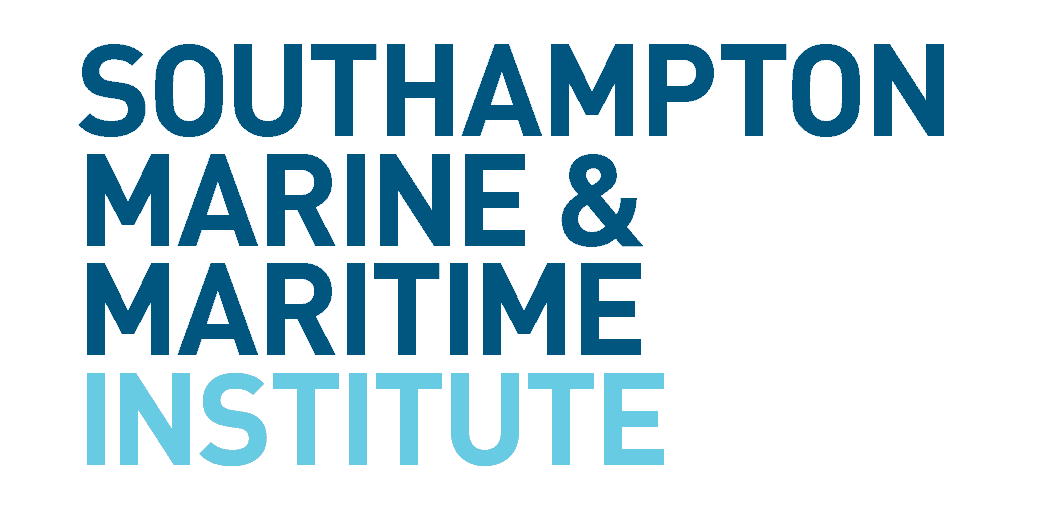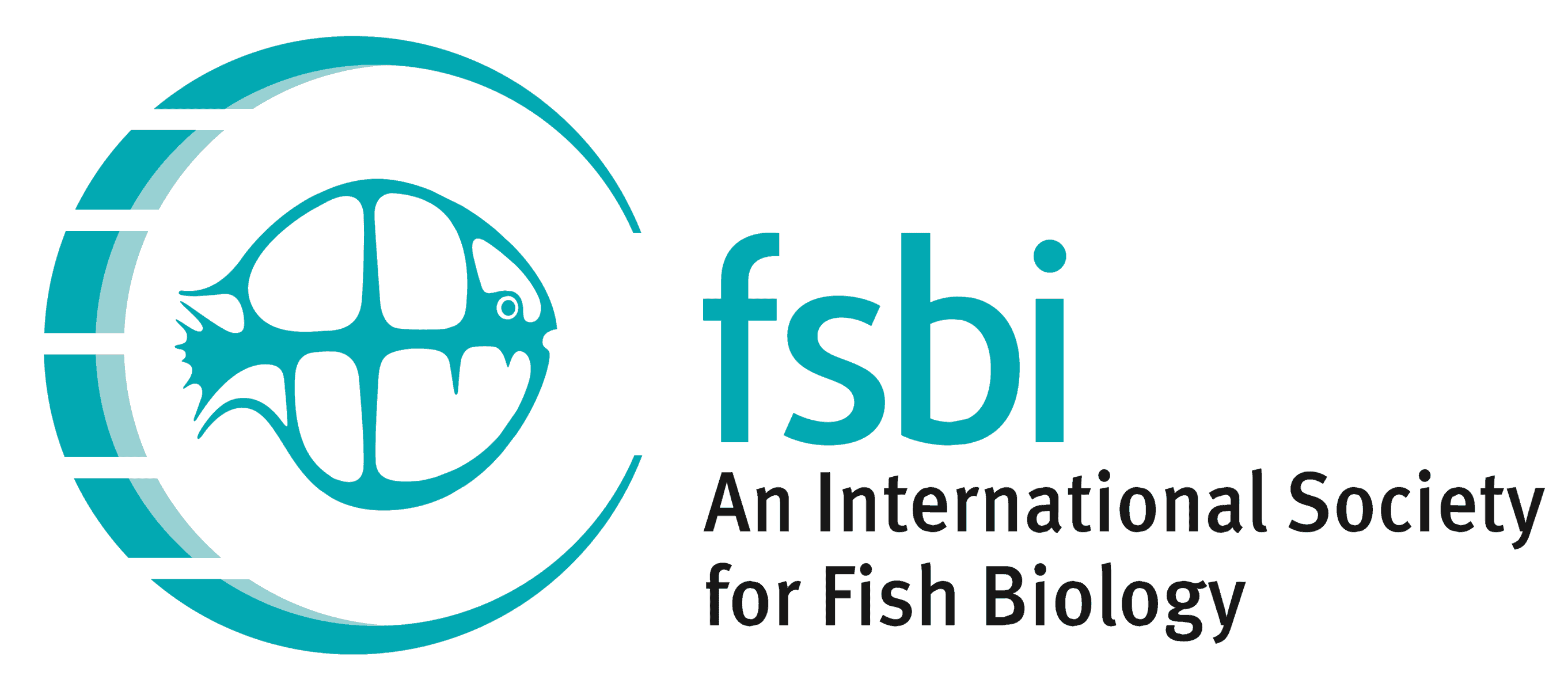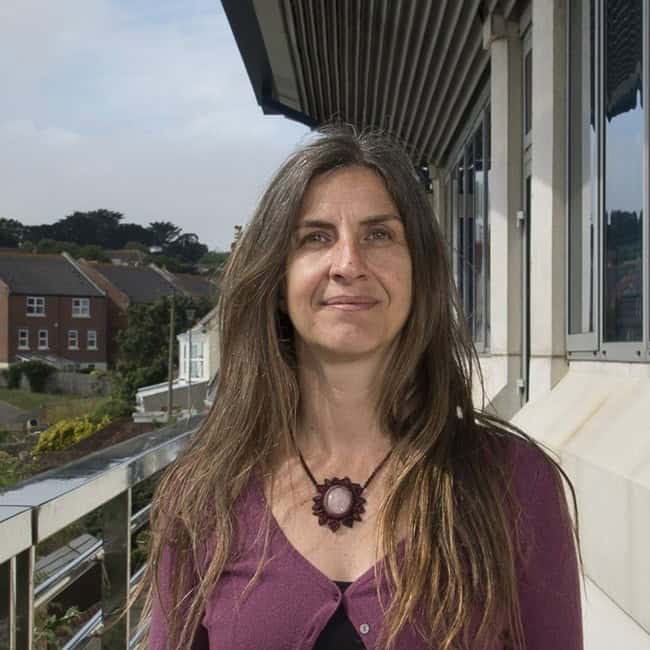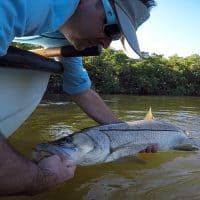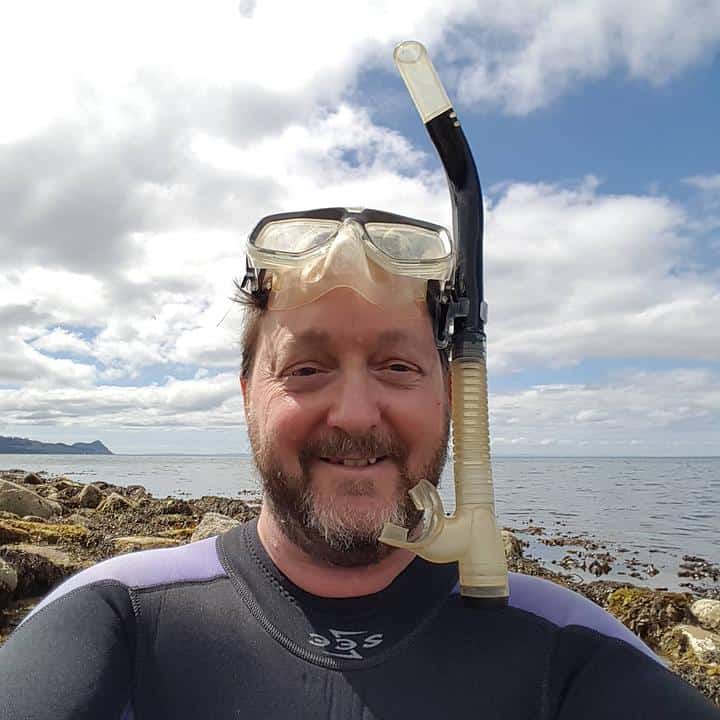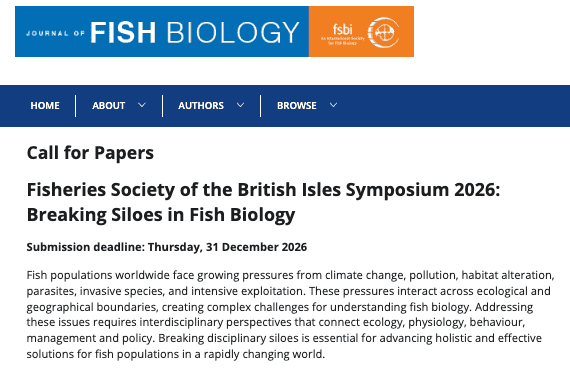FSBI 2026 Annual Symposium
27th-31st July 2026
Breaking Siloes in Fish Biology, Southampton
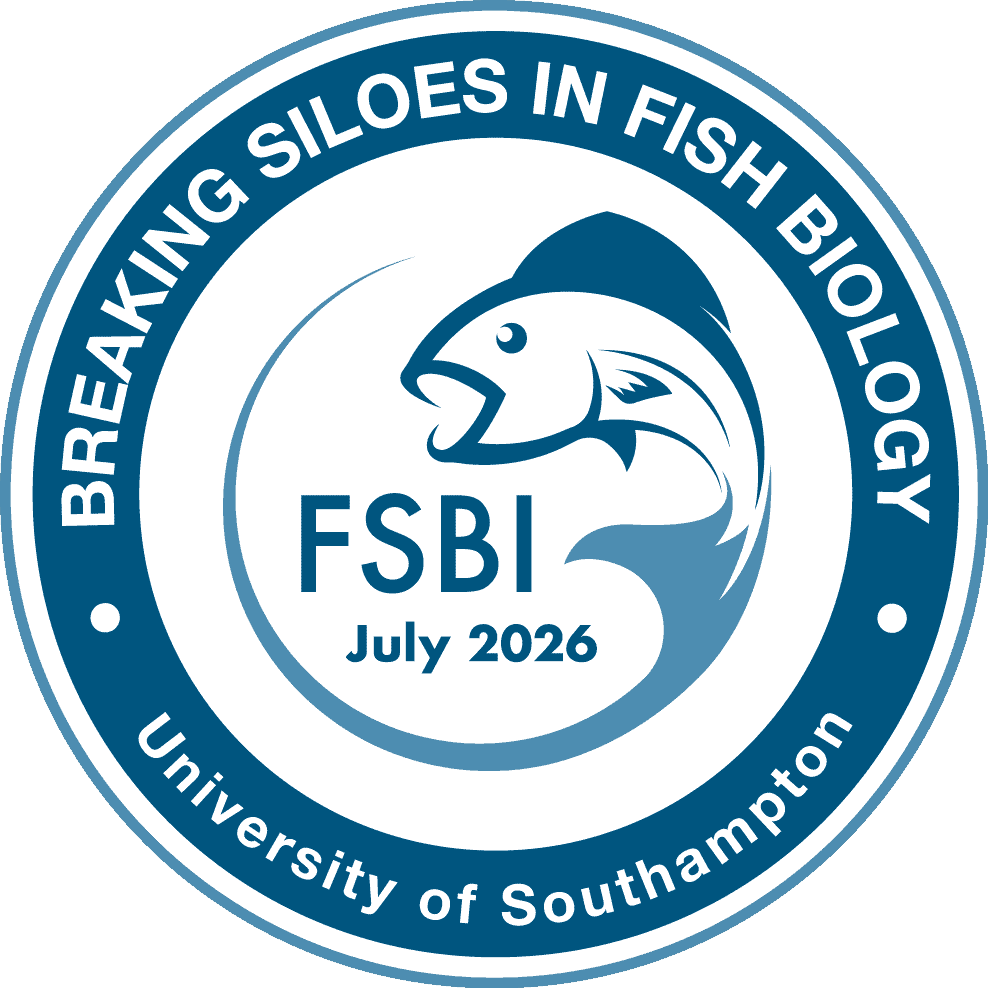
For any enquiries please contact FSBI2026@soton.ac.uk
Breaking Siloes in Fish Biology
Fish populations are facing extensive concurrent pressures from climate change, pollution, parasites, fishing and more. The impacts of these challenges create wide-ranging issues, such as food security, altered biogeochemical cycles, degraded habitat quality, and more. Developing future solutions to these diverse problems requires interactions among multiple disciplines. By breaking down siloes and actively engaging in interdisciplinary discussion and research, we can better inform legislation, management and policy, which happen at these borders.
Movement through transition zones
How do mobile fish, elasmobranchs, and marine mammals alter their ecology as they move through different types of habitats? This session will bring together researchers working at the interfaces between pelagic and inshore habitats, marine and freshwater systems, deep and shallow seas, and tropical to polar habitats.
Fish biology in a urbanised environment
What challenges do fishes face in aquatic ecosystems adjacent to urban areas? In this session, we aim to hear from ecological engineers, geographers, conservationists and more to understand how urban areas impact fishes in diverse areas of the UK and globally.
The fisheries-science policy interface
In the UN Decade of Ocean Science, how can we effectively facilitate dialogue among scientists, policy-makers, and the public to ensure the best possible outcomes by 2030? This session will aim to bring together academics, policy-makers, industry, and public-facing professionals to facilitate constructive dialogue on how to incorporate fisheries science effectively into policy.
Fish and human health
How could challenges facing fish stocks globally impact human health in the short and long-term? Here, we aim to bring together industry, medical professionals, policy-makers, and researchers working on topics related to aquaculture, fisheries, nutrition, and biochemistry.
Fisheries management in a changing world
How can we adapt fisheries management in the future to mitigate the impacts of projected future global change? In this session, we will bring
together practitioners working at the interface of fisheries science and global change biology to design actionable change for the future.
Patterns across ecological scales
How are fishes influenced by spatio-temporal variation in the organisms that they interact with,
such as prey, predators, competitors, parasites, commensals, etc? This session aims to characterize interspecific interactions among fishes and other taxa, bringing together researchers and practitioners
focused on trophic ecology, biomechanics, ecophysiology, behavioural ecology and more.
Incorporating behaviour and physiology into fish conservation
How can we incorporate science on fish behaviour and physiology into conservation solutions? Data from these disciplines is increasingly being recognized for its utility for animal conservation and resource management. This session will bring together behavioural ecologists and ecophysiologists with policy-makers and practitioners to devise applied conservation solutions.
Keynote Speakers
Patterns across ecological scales
TBD
Movement through transition zones
TBD
Fish biology in an urbanized environment
TBD
Abstract submission
***Submit your abstract here***
We look forward to welcoming you to University of Southampton 27-31 July 2026 for the annual meeting of the Fisheries Society of the British Isles. Please submit your abstract and associated information here by 2 February 2026 (17:00 GMT). It should be no longer than 250 words and should summarise the aim of your work, the findings in brief, and your main conclusion. We will aim to let you know if your abstract is accepted, and its format, by end of day on Wednesday 25 February 2026. In this form, you will also be directed to include: yours and your co-author's details, your career stage, the themes that you are interested in participating in, your format preference, whether you plan to apply for a FSBI travel grant, and your interest in potentially contributing to the special issue arising from the symposium.
FSBI Travel Grants
The FSBI offers the opportunity for its members to apply on a competitive basis for financial assistance in support of travel to the FSBI annual symposium. Note that only the 1st March deadline is applicable to this symposium. Click here for more information.

Key Dates
Abstract submission opens: 16 December 2025
Abstract submission deadline: 2 February 2026
Notification of abstract acceptance: 25 February 2026
Registration opens: 26 January 2026
Early bird and presenter registration closes: 27 May 2026
Late registration closes: 10 July 2026
Venue
The 2026 symposium will be held at the University of Southampton, with the main venue for talks and posters the Centenary Building (B100) on the University's Highfield Campus.
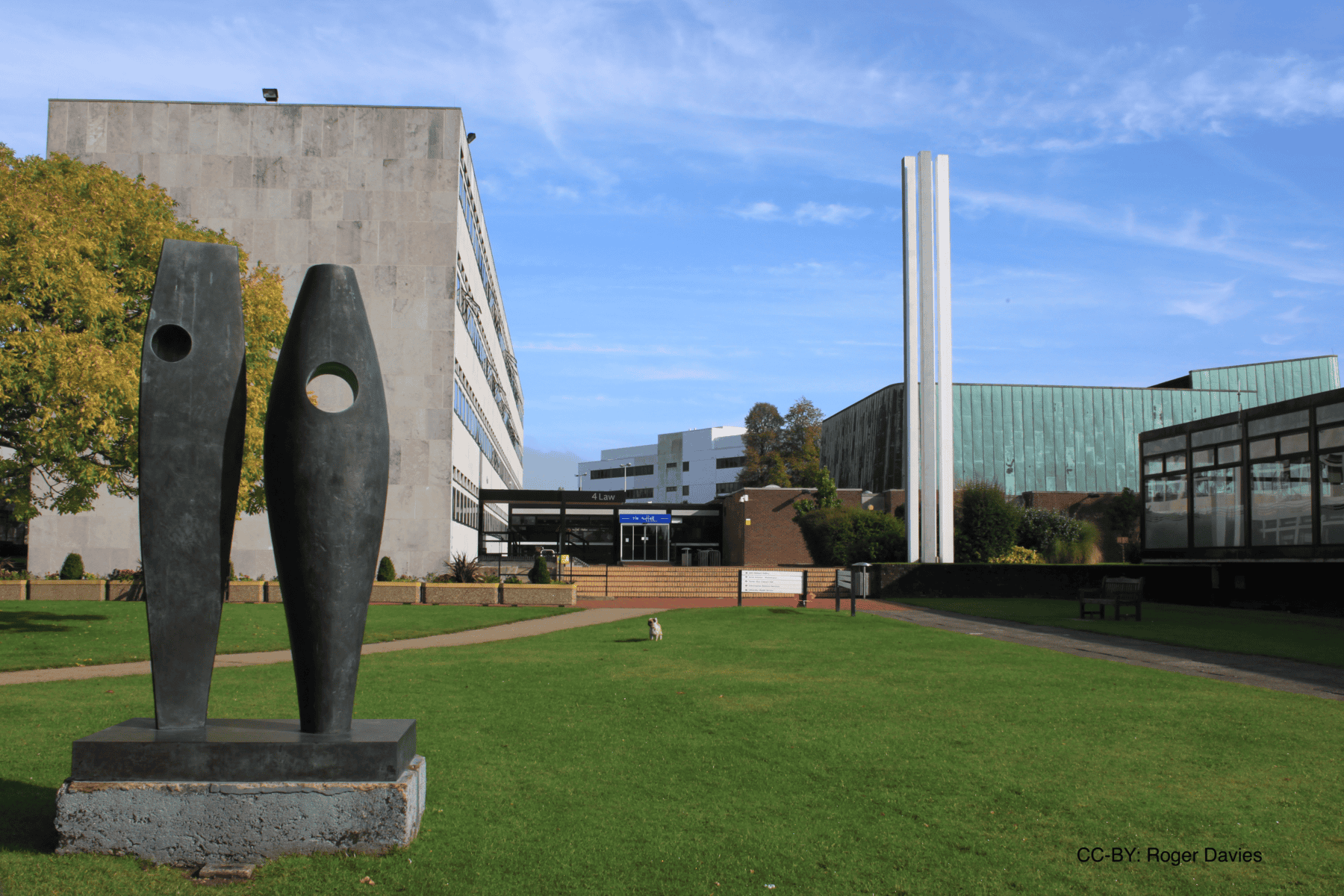

Social Events & Excursions
The organising committee has been busy planning a productive and exciting week! There will be workshops and special interest groups to brainstorm topics for synthesis papers, fun excursions and lots of social events, including a fish quiz, an early morning ‘spawning run’, and a drinks reception at National Oceanography Centre.
Excursions will take place in the morning on Monday 27 July, and include one marine and one freshwater activity.
The first excursion will take place on R.V. Callista, our purpose built operational research vessel here at the University of Southampton's waterfront campus (based at the National Oceanography Centre). This planned excursion will include approximately three hours (0900-1200) exploring Southampton Water, showcasing scientific methods used for surveying coastal habitats and fisheries.
The second excursion will visit the Aquatic Research and Conservation Centre at Sparsholt College to tour their fish holding facility, which facilitates extensive work with freshwater fishes often in collaboration with industry.
The third excursion will visit the River Itchen, an iconic chalk stream and home of the Atlantic salmon. The planned excursion will be based locally at Woodmill, right at the tidal limit. As the number of salmon returning to the river continues to decline, you will hear from multiple stakeholders that are working together to reverse this trend. The urban location provides an ideal site for discussing some of the challenges and opportunities surrounding salmon conservation and management.
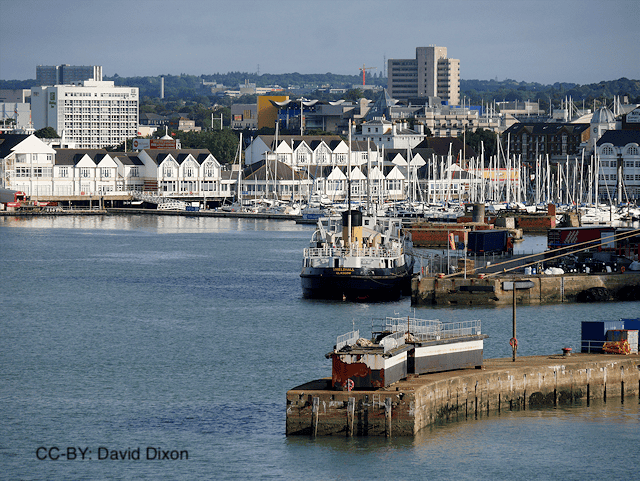

Childcare
We are exploring availability of childcare through a local nursery or creche. This would be an additional expense. If you would like to request further information on this, please email the organizing committee at fsbi2026@soton.ac.uk. We are committed to working with individuals to make the meeting as accessible as possible to those with caring responsibilities.
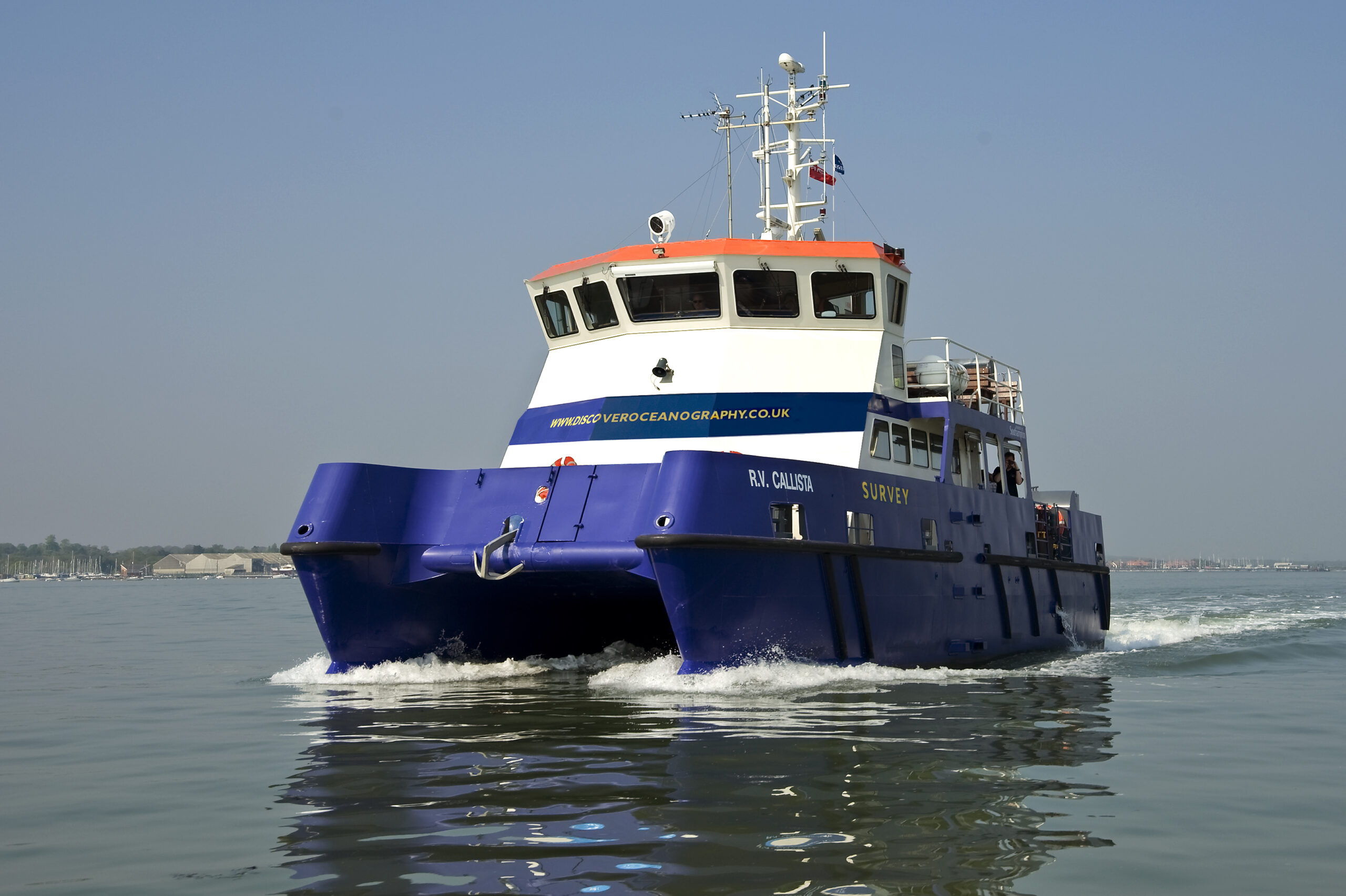
Travel information
We are excited to announce the FSBI will be unveiling their second round of “Green Travel Awards” at the 2026 Symposium in Southampton. These awards are intended to promote awareness of the climate crisis and to encourage those that are coming in person to make greener travel choices wherever possible.
We realize that funding issues, family commitments and other time or work constraints may prevent you from going as ‘green’ as you would like to, but we applaud any efforts that reduce your environmental footprint. So please consider trying to use greener modes of travel and share your story to be in the running for a Green Travel Award.
Help us to promote these new awards by sharing your travel plans/ideas/journey on social media tagged with #FSBIGreenTravel. To enter the award please fill out this form: https://tinyurl.com/FSBIGreenTravel. We will collate and share our favourite stories, and at the banquet we will announce three winners (Fish Net Zero; Not Flying Fish; Fish Against Flying). Any questions please email anna.sturrock [at] essex.ac.uk
There is some helpful advice on travelling to Southampton on the Visit Southampton webpage, and we will add more detail about getting to the conference venue here in due course. Please try to travel reducing your carbon footprint as much as possible.
TRAIN
Southampton Central rail station is served by direct trains to and from many cities - about 1.5 hours from London, 4 hours from Manchester and 2.5 hours from Birmingham. National Rail Enquiries is a good place to find out more.
BUS/COACH
There is a National Express coach station in Southampton, with links to many major UK cities. Find out more on the National Express website.
CAR
You can access Southampton from the M3 and M27 motorways.
Special Issue of the Journal of Fish Biology
This Special Issue aims to highlight research that advances inter- or transdisciplinary understanding of fish biology across habitats, scales and research disciplines. We welcome studies that combine social, ecological, physiological, behavioural or environmental perspectives to address current and future challenges for fish populations. We also encourage submissions that strengthen the interface between science, management and policy, and that propose practical pathways for fish conservation and sustainable fisheries. Original research articles, review articles, brief communications and opinion pieces are welcome, particularly those demonstrating how integrated approaches generate insights and tools for applied outcomes. Through this Special Issue, the Journal of Fish Biology aims to support collaborative research that informs effective legislation, management and policy in a changing world.
Symposium Committees
Local Organising Committee
Lauren | Nadler | University of Southampton |
Claudia | Ofelio | University of Portsmouth |
Ryan | Reisinger | University of Southampton |
Christopher | Goatley | University of Southampton |
Martina | Stiasny | University of Southampton |
Nic | Bury | University of Southampton |
Clive | Trueman | University of Southampton |
Robert | Robinson | University of Southampton |
George | Clarke | University of Southampton |
Andrew | Vowles | University of Southampton |
Mahmud | Hasan | University of Southampton |
Rebecca | Bridge | University of Southampton |
Oscar | Speed | University of Southampton |
Lucy | Hempleman | University of Southampton |
Jethro | Reading | University of Southampton |
Ben | Bluck | University of Southampton |
Vicky | Dominguez Almela | University of Southampton |
Helen | Currie | University of Portsmouth |
Paul | Kemp | University of Southampton |
Bex | Greatorex | University of Southampton |
Anna | Sturrock | University of Essex |
Will | Perry | Cardiff University Water Research Institute |
Chris | Brodie | Haskoning & Trace Biomonitoring |
Scientific Advisory Committee
Lauren | Nadler | University of Southampton |
Ryan | Reisinger | University of Southampton |
Christopher | Goatley | University of Southampton |
Martina | Stiasny | University of Southampton |
Nic | Bury | University of Southampton |
Clive | Trueman | University of Southampton |
Robert | Robinson | University of Southampton |
Andrew | Vowles | University of Southampton |
Helen | Currie | University of Portsmouth |
Paul | Kemp | University of Southampton |
Anna | Sturrock | University of Essex |
Catherine | Gutmann Roberts | RSK Biocensus |
Demetra | Andreou | University of Bournemouth |

The 2026 FSBI Symposium is proudly convened by
And sponsored by

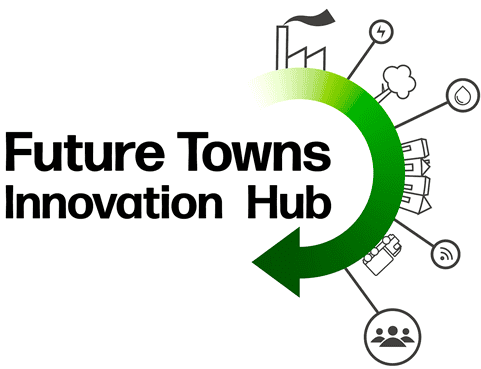


Biosystems is the commercial division of Tropical Marine Centre Ltd, and manufacture Recirculation Filtration Systems, biologically optimised LED Lighting, and advanced Lighting Control Systems.
